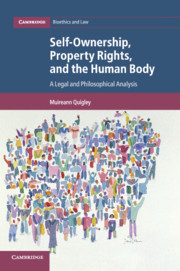Description
Self-Ownership, Property Rights, and the Human Body
A Legal and Philosophical Analysis
Cambridge Bioethics and Law Series
Author: Quigley Muireann
How should the law deal with the challenges of advancing biotechnology? This book is a philosophical and legal re-analysis.
Language: English
Subject for Self-Ownership, Property Rights, and the Human Body:
Approximative price 38.06 €
In Print (Delivery period: 14 days).
Add to cart
Self-Ownership, Property Rights, and the Human Body
Publication date: 01-2020
Support: Print on demand
Publication date: 01-2020
Support: Print on demand
Approximative price 135.14 €
In Print (Delivery period: 14 days).
Add to cart
Self-Ownership, Property Rights, and the Human Body
Publication date: 04-2018
360 p. · 15.7x23.6 cm · Hardback
Publication date: 04-2018
360 p. · 15.7x23.6 cm · Hardback
Description
/li>Contents
/li>Biography
/li>
How ought the law to deal with novel challenges regarding the use and control of human biomaterials? As it stands the law is ill-equipped to deal with these. Quigley argues that advancing biotechnology means that the law must confront and move boundaries which it has constructed; in particular, those which delineate property from non-property in relation to biomaterials. Drawing together often disparate strands of property discourse, she offers a philosophical and legal re-analysis of the law in relation to property in the body and biomaterials. She advances a new defence, underpinned by self-ownership, of the position that persons ought to be seen as the prima facie holders of property rights in their separated biomaterials. This book will appeal to those interested in medical and property law, philosophy, bioethics, and health policy amongst others.
1. Bodies of value; Part I. Human Tissues and the Law: 2. Regulating the uses of biomaterials: consent and authorisation; 3. Property in the body?; 4. A property (r)evolution?; Part II. Property and Persons: 5. What is property? I: bundles and things; 6. What is property? II: rights and interests; 7. The scope and bounds of self-ownership; Part III. Beyond Self-Ownership: 8. Property rights in biomaterials; 9. Transferring bodily property; 10. The future of human biomaterials?
Muireann Quigley is Professor of Law, Medicine, and Technology at the University of Birmingham. Before moving to academia she was a medical doctor. Her research is explicitly interdisciplinary and focuses on the philosophical analysis of law and policy. She is particularly interested in biotechnological advances and innovations, and how these can and ought to be dealt with by society. She has previously held a number of research grants, including from the Wellcome Trust and the Leverhulme Trust. She is a member of the Editorial Board of Medical Law International. In 2012 she won the Mark S. Ehrenreich Prize in Healthcare Ethics Research.
© 2024 LAVOISIER S.A.S.

